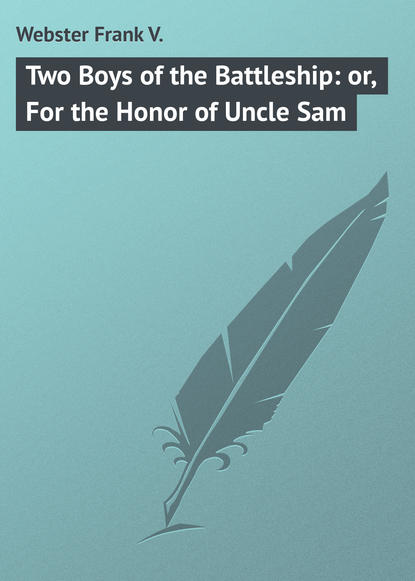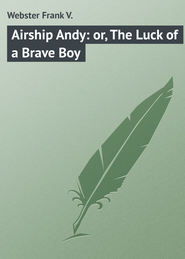По всем вопросам обращайтесь на: info@litportal.ru
(©) 2003-2024.
✖
Two Boys of the Battleship: or, For the Honor of Uncle Sam
Настройки чтения
Размер шрифта
Высота строк
Поля
“Does he know anything about Uncle Phil’s affairs?” asked Ned.
Mr. Kennedy inquired, but the man shook his head. He seemed much disheartened. Possibly he imagined he would be executed.
“And to think we have to come away, and leave at the bottom of the sea evidence that would free Uncle Phil,” said Frank regretfully, as the rescue boat towed them away from the place where the box had sunk.
“Yes, it is too bad,” agreed his brother. “Well, maybe things will take a better turn, now that the revolution is broken up and Bernardo and his crowd scattered.”
“I hope so,” returned Frank, thoughtfully.
When they reached the city the man they had picked up was turned over to the military authorities. Then Frank and Ned reported to their commanding officer. He had just begun to wonder where they had gone, as the fighting was all over, and the blue-jackets (though they all wore white now instead of blue) were reporting back.
“And so they got away?” asked the lieutenant, after hearing the story of our two heroes.
“Yes, and all because of a pint of gasoline!” said Frank, bitterly. “If we’d had that much we could have caught them, I’m sure.”
“But not in time to have saved the box of papers,” Ned remarked.
“Oh well, maybe they’ll be caught, and we can force Bernardo to make a confession and free Uncle Phil,” went on Frank, more hopefully. But Ned shook his head. He did not have much faith.
“Are we to stay on shore longer?” asked Frank of their lieutenant, as the boys and the rest of their squad went back to the coffee warehouse.
“I don’t know. I am waiting for orders. I think we’ll go back, though.”
And a little later word to this effect was sent to them. Those who had borne the brunt of the fighting were ordered back to the Georgetown, while fresh men replaced them as a guard to American interests on shore.
“I guess they want to give the other fellows a chance to have some of the honor and glory,” said Hank Dell, as our friends were on their way to the battleship.
But there was no more fighting that night. Matters were quiet in the capital, though rumors came in of little skirmishes in the outlying districts. The backbone of the revolution seemed to have been broken.
Frank and Ned felt very badly about the loss of the tin box. They felt more sure every hour that it contained just the evidence needed to free their uncle. But the box, at the bottom of the bay, seemed gone beyond hope of recovery.
“Of course Uncle Phil may get out, eventually, anyhow,” suggested Ned, “but I want to see him out now.”
“So do I,” chimed in Frank.
Affairs began to straighten themselves out in the little republic that had gone through such strenuous times. The American and other merchants made preparations to resume their interrupted businesses. For a time it was thought that Bernardo would be caught, but he appeared to have made good his escape.
Then suddenly, about a week later, without warning, the revolutionary fighting broke out again. It appeared that Bernardo and his rascals had landed farther down the coast, and had, by making a detour, reached their stronghold in the hills back of the town. There they made ready for a new attack.
It was made shortly after sunrise one morning following a night march, and at once the alarm was signaled out to the battleship. For some marines had been left on shore to act as guards and sentries, and their commander quickly sent word for reinforcements.
Once again was the call to arms sounded on the Georgetown. Again did the men take to the boats with their rifles and field pieces. Again came that rush on shore and once more the streets of Pectelo echoed to the sounds of fighting, and the rattle of rapid-firers.
But the second effort of the revolutionists was as but a flash in the pan compared to their first attempts, though there was severe fighting in one or two places, and many were killed and wounded, a number of the force of the Georgetown meeting death. But it could not be helped.
Frank and Ned were again permitted to have their share in the hot and exciting work, and this time Frank received a wound in the leg which made it necessary for him to go to the rear.
“I’ll go with you,” offered Ned, as his brother was picked up.
“No, you won’t!” cried Frank. “You stick it out! Maybe you’ll have a chance at Bernardo. I hear he’s on the job again.”
The plucky lad waved his hand at his brother as they bore Frank back to the landing stage to send him aboard the ship where he could have better treatment than in the city hospital.
“Why, the Georgetown is coming closer in shore!” Frank cried, as he looked across the bay and noticed that the vessel was at a new anchorage.
“Yes,” said one of the petty officers, “the old man is going to shell the revolutionary headquarters again, and he’s going to make a good job of it this time. So he put in closer to shore for the work.”
“Good!” cried Frank. “Maybe I’ll have a chance at the guns, if I did have to give up fighting on land.”
“I’m afraid you won’t – not with that leg. And they’re going to bombard soon,” was the answer.
The party taking off the wounded men, of whom there were several besides Frank, waited until the battleship had dropped her anchor in the new location. Then they went aboard, and soon afterward there began a bombardment of the hill section where the rebels had again set up their camp.
The shells from the big guns, as well as those from the smaller ones, flew screeching over the town, and burst in the neighborhood of the two hills, at one of which Frank had fired. The destruction was terrific, but the loss of life small, as most of the rebels were down in the city fighting. Much to his chagrin Frank was not allowed to serve “his” gun, as he called the forward fifteen-inch gun.
But as I have said, the second effort of the rebels did not amount to much. They were soon put to flight, and the effect of the ship’s bombardment, added to the hot fire from the blue-jackets on shore, soon brought the revolution once more to an end. It was most effectually broken this time.
“And that’s not the best of it!” cried Ned, when he came on board with his mates, dirty and powder-stained. “That’s not the best of it, Frank, old man!”
“It isn’t? what is?”
“How’s your leg?”
“Oh, never mind my leg! It’s all right – not so bad. Tell me the news!”
“They captured Bernardo and his gang!”
“They did? Who?”
“I don’t know. Some of our boys, I believe. He’s locked up in the military prison, I hear, and is to be tried as a traitor.”
“Good! Now maybe we can get out of him something that will clear Uncle Phil!”
“Oh, if we only can!” cried Ned.
But it was a vain hope. Bernardo was indeed captured, with most of those who had plotted with him. Some had been killed. The rebel leader, however, maintained an absolute silence when questioned in regard to the boys’ uncle. Mr. Kennedy proved an invaluable friend in conducting these negotiations for Frank and Ned, but they came to no end. Bernardo insisted that Mr. Arden was mixed up in the revolution, and that he was guilty of the political crimes for which he had been convicted. It seemed hopeless to Frank and Ned, and they were more disheartened than ever.
The revolution had been put down, and the Americans and their property in Uridio protected, but it had cost something in gallant lives of the men and youths from the Georgetown. Several had been killed, and more than a score wounded.
But it was in a just cause, and perhaps it had to be. There were some sad scenes following the fighting.
The rebels were dispersed, and most of them renewed their allegiance to the government and were pardoned. Not so, however, Bernardo and his ringleaders. To the end, when he received a sentence of life imprisonment, he maintained that Mr. Arden was guilty of the crimes charged against him.
“And to think if we only had that box, which is at the bottom of the bay, we might free him,” sighed Ned.
“It’s too disheartening to think of,” Frank declared, shaking his head slowly.
Their story was now quite well known, and some of their comrades received permission to use nets, dragging them on the bottom of the bay, in the hope of bringing up the box. Ned helped, and so did Frank when his leg healed, which it did in about ten days. But the efforts were fruitless.










